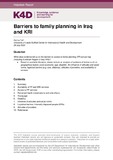| dc.contributor.author | Tull, Kerina | |
| dc.coverage.spatial | Iraq | en |
| dc.date.accessioned | 2020-08-28T12:44:55Z | |
| dc.date.available | 2020-08-28T12:44:55Z | |
| dc.date.issued | 2020-07-28 | |
| dc.identifier.citation | Tull, K. (2020). Barriers to family planning in Iraq and KRI. K4D Helpdesk Report 849. Brighton, UK: Institute of Development Studies. | en |
| dc.identifier.uri | https://opendocs.ids.ac.uk/opendocs/handle/20.500.12413/15604 | |
| dc.description.abstract | This rapid review examines evidence on the barriers to access to family planning (FP) across Iraq (including Kurdistan Region of Iraq/ KRI). It focuses on the reported social and cultural barriers, as well as logistical barriers, to FP in Iraq and the Kurdistan Region of Iraq (KRI). Data on internally displaced people (IDP) in Iraq and refugees in Jordan and Turkey are also included. Attitudes of SRH service providers (qualitative research and anecdotal evidence) are also discussed. The literature notes that although free FP care is provided in government health centres, research has shown poor utilisation of public services, as well as a general preference to use private services in women who can afford it. This may due to inadequate provision of information and poor interpersonal communication, which has been found in primary health care centres (PHCCs). Contraceptive pills are reported to be available in most pharmacies across Iraq, however, there are significant geographical disparities, with less access in rural locations. The literature also notes that socio-economic conditions also impedes women’s free access to FP services. Health reasons and side effects were noted in four in ten (44.4%) people as a reason for not using contraceptives in Basrah and perceived harmful effects of condoms were reported by 30.2% of men from Erbil. Although research shows that there is high knowledge of SRH in women, women of poor households have the highest unmet contraceptive need. This is probably because they fall short in terms of information on access to methods. Information is scarce on the actual needs and priorities for adolescents and youth in Iraq, including the most vulnerable, such as IDPs, refugee and returnee adolescents, however, unmarried adolescents have reported difficulty accessing services, as premarital sex is disapproved of. Although there are laws against it (2013 Law 38), disabled adolescents are also discriminated against and there is no data available on their actual use of SRH services. Another key highlights of the literature examined include influence of cultural attitudes, social norms and religion encourate people to refrain from using contraceptives and FP methods. | en |
| dc.language.iso | en | en |
| dc.publisher | Institute of Development Studies | en |
| dc.relation.ispartofseries | K4D Helpdesk Report;849 | |
| dc.rights.uri | https://www.nationalarchives.gov.uk/doc/open-government-licence/version/3/ | en |
| dc.subject | Gender | en |
| dc.subject | Health | en |
| dc.subject | Rights | en |
| dc.subject | Sexuality and Development | en |
| dc.title | Barriers to Family Planning in Iraq and KRI | en |
| dc.type | Helpdesk | en |
| dc.rights.holder | © DFID - Crown copyright 2020 | en |
| dcterms.dateAccepted | 2020-07-28 | |
| rioxxterms.funder | Department for International Development, UK Government | en |
| rioxxterms.identifier.project | K4D | en |
| rioxxterms.version | VoR | en |
| rioxxterms.funder.project | 238a9fa4-fe4a-4380-996b-995f33607ba0 | en |

